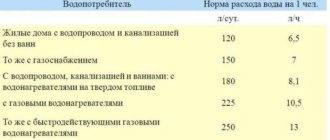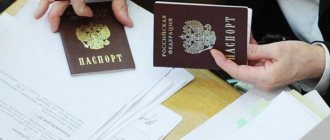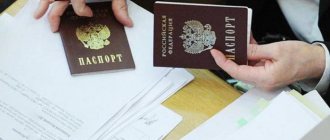Home / Real estate / Housing rights / Registration / Responsibility
Back
Published: 10/25/2017
Reading time: 6 min
0
415
Registration is one of the integral measures for a person to inform the state of his new place of residence or stay.
- Registration deadlines
- Normative base
- How to avoid a fine?
- Fine amounts
- Payment
The legislative framework
The procedure for registering Russian citizens is regulated by Government Decree No. 713 of July 17, 1995, Law on Freedom of Movement No. 5242-1 (in force since June 25, 1993) and Order of the Ministry of Internal Affairs of the Russian Federation No. 984 (adopted December 31, 2017).
As for foreigners, the following regulations apply to them:
- Federal Law No. 109 “On Migration Registration”;
- Government Decree No. 9 of January 15, 2007
- Order of the Ministry of Internal Affairs No. 514.
Failure to comply with legal requirements regarding permanent or temporary registration is punishable in accordance with Art. 19.15.1 and 18.8 of the Administrative Code (for Russians and foreigners, respectively).
In addition to sanctions from the state, the lack of residence permit (registration) entails a number of additional inconveniences associated with the inability to perform certain actions or use services. This applies, in particular, to receiving medical care under compulsory medical insurance, loans from banks or microfinance organizations, enrolling a child in kindergarten, etc.
Do without paying
In rare cases, renewal of registration can be carried out without paying a fine.
To do this, you must have compelling reasons that can be documented.
Such reasons include, for example, hospitalization, funeral of a relative, long trip for work matters, etc.
In other cases, the person applying for renewal of the certificate, if the registration is expired, is obliged to pay the amount specified in the law to the state.
You can find out what to do if you have nowhere to register, as well as how to renew the registration of a foreign citizen on our website.
Types of registration
In Russia there is permanent and temporary registration of citizens. In the first case, we mean registration at the place of permanent residence or actual stay (house, room, apartment).
As for temporary registration, it applies to citizens who are not permanently at the specified address, but only for a certain period of time.
Similar rules apply to foreigners. A situation is allowed when a person has both temporary and permanent registration. However, the presence of several permanent and temporary registrations is excluded.
How to avoid a fine?
There are various reasons for delays in registering – from banal forgetfulness to reluctance to register. The most common are:
- Refusal to register due to one’s unwillingness to do so;
- Impossibility of obtaining temporary registration for reasons beyond a person’s control (being on a business trip or undergoing long-term treatment in a hospital due to a health condition);
- Delay in receiving the necessary documents by the registration authority (if requests were sent to other regions, and responses to them take a long time to be sent to the region of the request).
In order to avoid the imposition of penalties for late registration on the last two grounds, it is necessary to obtain documentary evidence of the existence of the listed objective circumstances.
These documents must be submitted to the migration authorities, which have imposed an administrative penalty in the form of a mandatory fine.
If such a penalty has not been canceled there, with available documents confirming the impossibility of registering earlier, as well as with a response about a reasoned refusal, the person on whom the fine was imposed has the right to appeal to higher authorities or the court.
What is the fine for not having registration in your passport?
The amount of financial sanctions depends on the circumstances of the offense, the actual location of the perpetrators and is:
- for a citizen of the Russian Federation who does not have a residence permit - from 2 to 3 thousand rubles (in St. Petersburg and Moscow - from 3 to 5 thousand rubles);
- for tenants and owners of premises (individuals) – from 2 to 5 thousand rubles (in St. Petersburg and Moscow – from 5 to 7 thousand rubles);
- for tenants and owners of premises (legal entities) - from 250 to 750 thousand rubles (in St. Petersburg and Moscow - up to 800 thousand rubles).
As for unregistered foreigners, they are subject to a fine of 2 to 5 thousand rubles with or without possible deportation. If the violation occurred in St. Petersburg (Leningrad Region) or Moscow (Moscow Region), the fine will increase to 5 - 7 thousand rubles (with or without deportation). A similar punishment is provided for a repeated violation within a year (with unconditional deportation from the country), and for Moscow and St. Petersburg (including the Moscow and Leningrad regions) - from 7 to 10 thousand rubles (plus deportation).
How quickly do you need to register a newborn?
The law does not determine the exact time during which registration for a newborn must be obtained. Only a few norms are formalized by law:
- When completing an application to register a child, you will need a birth certificate;
- The newborn must be registered at the place of residence of the closest relatives or legal representatives;
- A newborn cannot be registered at the place of residence of second-degree relatives;
- In the first month of a child’s life, registration is issued at the request of the mother without the participation of the father;
- If the mother, due to insurmountable circumstances, cannot register the child within 30 days, the father is allowed to register, but must do so at the mother’s place of residence;
- After a month, registration of a newborn can be carried out exclusively in the presence or with the notarized consent of both parents;
- A newborn must certainly be registered at the address of residence of his legal representatives.
The policy of the Russian Federation regarding internal migration contains many contradictory and controversial issues. But regardless of the subjective attitude to some issues, citizens are obliged to comply with the laws of the country.
When a fine is not imposed
Upon arrival at a new place of residence, a citizen must deregister from his previous registration and register at a new address within 7 days. If he already has a permanent residence permit, then the law allows 90 days to obtain temporary registration. No fines will be imposed during these periods.
Failure to register in a passport is not punishable in the following cases:
- If a person lives with his close relative, registered at this address and who is the owner of the living space. These include parents, children, grandparents, grandchildren, and spouses.
- If a person is officially registered in a given city and lives in the same city, but at a different address.
- If a person is officially registered in the region and lives on the territory of a given subject of the federation. For example, a resident of the Leningrad region does not need temporary registration for the period of residence in St. Petersburg.
A fine may not be imposed if the person with missing registration has valid reasons - for example, emergency hospitalization, emergency business trip or difficult life circumstances.
What is the deadline for registration?
The legislation allows 3 months to complete the list of necessary papers and obtain a new registration mark in the passport. This means that when changing the address of residence, a citizen is obliged to submit an application to the migration authorities to complete registration within 90 calendar days from the date of move.
When registering temporarily, a citizen has the right to retain his registration at his old residence address.
Citizens or residents of the country who do not have a general passport receive a registration certificate instead of a stamp in the passport. The certificate has the same legal force as a stamp in a passport.
The Russian government has established specific deadlines within which government authorities are required to register a citizen:
- When submitting an application to the territorial office of the Ministry of Internal Affairs, the time for processing the application is 3 days;
- When contacting a multifunctional center (MFC) or a passport office department, the period increases to 8 days.
The registration period for foreign citizens is determined by Federal Law No. 109. The text of the document states that the period of stay of foreign citizens without registration on the territory of the Russian Federation is limited by the validity of a visa or migration card.
The visitor is obliged to leave the borders of the state before the completion of permits, or to submit an application to obtain a residence permit, permanent registration and a work patent.
You may also like
1
Filling out the form to participate in the program...
6 857
To register at the desired address, you must submit a completed application to one of the regulatory authorities and collect the required set of documents.
Is it possible to challenge the imposition of a fine?
The legislation provides a period of 10 days for appealing the administrative protocol. If the fine is not contested within this time, the decision to impose a penalty will enter into force.
Russian citizens may pay a fine for failing to register within 60 days. As for foreigners, they are required to repay the debt the next day after the collection order comes into force (if deportation is not ordered).
Who is not responsible
Legislative acts stipulate cases in which persons who fail to register on time are not subject to administrative liability:
- Children, spouses and parents living together;
- Those who do not live by registration within the boundaries of the locality where registration is registered;
- Those who do not live by registration within the borders of the subject of the federation where registration is registered.
These categories of citizens do not violate the law, and any infringement of rights due to missing registration may serve as a reason for legal proceedings.
Consequences of delay
If a foreigner has not been registered within the prescribed time frame or has not renewed his existing registration, he will have to face some unpleasant consequences. These include:
- a large fine is imposed for overdue temporary registration;
- if the delay is only a few days, then any punishment can be avoided if the person promptly leaves the country;
- if the delay is significant, then even when crossing the border a violation will be detected;
- if the lack of registration is discovered by FMS or police officers, the foreigner is forcibly deported to his home country;
- In case of a repeated violation or a long stay in Russia without registration, a ban on entry into the country may be imposed altogether.
If measures in the form of a ban are applied to a foreigner, then if in the future he wants to visit Russia again, he simply will not be able to cross the border. Therefore, a fine for late registration is considered not too harsh and severe a punishment. Before traveling, every foreigner should make sure that there is no prohibition, and information can be obtained on the website of the Main Directorate for Migration Affairs of the Ministry of Internal Affairs.
Validity period of the received document
After registration, a detachable part of the application is issued, which is used by the foreigner as confirmation of his legal presence in the country. This document is valid only for three months. It is possible to extend its validity period, for which you must contact the Ministry of Internal Affairs again.
If a foreigner has overstayed his temporary registration because he did not renew the document, he will have to pay a fine. If a person does not know whether his registration is valid, he can check it at the department of the Ministry of Internal Affairs or at the Federal Migration Service.
What does it mean to “register a car”
What is this. Each car has individual tags by which it can be recognized by a traffic police officer, a diagnostic center and a camera. Such labels by law include:
- individual body, chassis or frame number (VIN) - a stamp that is placed at the factory;
- registration certificate, or PTS - prepared by the manufacturer, it comes complete with the car;
- state registration plates, or numbers. They are issued at the registration department of the traffic police;
- registration certificate (CTC) - issued by the traffic police.
When a traffic police officer registers a car, he enters all this data into a special database - the register of vehicles. And the driver is given STS, numbers and supplements the PTS.
Deadline for vehicle registration. The driver has 10 days from purchasing the car to register it. The date of purchase is indicated in the purchase and sale agreement. It doesn’t matter whether the car was purchased at a showroom or secondhand.
How much does it cost to register a car? If the car is new, the traffic police issues signs, STS and makes an entry in the PTS. For all this, the driver pays a state fee:
| The traffic police issues | price, rub. |
| license plate, 2 pcs. | 2000 |
| STS | 500 |
| change in PTS | 350 |
| Total | 2850 |
If you register a used car, then registration marks are not needed - they will be passed on to you from the previous owner. All that remains is to pay only 850 rubles for the issuance of a new STS and changes to the PTS.
Why is registration needed? If a driver in a new car without registration breaks the rules, for example, drives drunk, hits a pedestrian and flees the scene of the accident, it will be difficult to hold him accountable. Traffic cameras read the number plate, but it won’t be on such a car.
How to defer registration. The law does not provide for this.
How to check if a car is registered. Go to the verification page on the traffic police website and enter the VIN of the car in the field at the top of the page. This number can be found in the STS or PTS of the car.
The driver prepares such a package of documents when registering the car
Payment of overdue traffic fines through State Services
In recent years, payment of overdue traffic police fines has increasingly been carried out through the State Services portal. To do this you need to do the following:
- log in to the site;
- go to the “Payment” section;
- activate the menu subsection “Payment of traffic police fines”, and then follow the instructions of the program, which will allow you to quickly pay the existing debt. To do this, you will need to enter information about your driver's license and vehicle.
Photo No. 3. Payment of traffic police fines on the State Services information and reference portal
The online payment service offered by the State Services portal is deservedly considered one of the most convenient. This is confirmed by the fact that first he always invites the user to check his debts on traffic police fines and only after that proceed to filling out the payment details.
Why do you need registration?
In modern legislative acts, the outdated concept of “registration” has been replaced by registration at the place of residence or stay. But in everyday life of Russians, both terms are still used with equal frequency. Moreover, many citizens do not see the difference between these legal terms at all. There are still differences between them:
- Soviet registration was provided by local authorities to a citizen as permission to reside in a certain living space on a permanent or temporary basis. Lack of registration was a violation of the law, subject to criminal prosecution.
- Modern registration is not of a permissive, but of a notification nature. That is, a person, by registering with the local passport and visa service, informs the local authorities that he lives at such and such an address in the territory under their jurisdiction.
Modern registration is de jure a voluntary act of a citizen. The Constitution of the Russian Federation directly declares the freedom of movement of Russians throughout the territory of the state, as well as their right to choose their place of residence at their own discretion. In addition, the legislation directly prohibits any discrimination against citizens based on their social status. Lack of registration cannot serve as a reason for infringement of civil rights.
In reality, this is far from the case. Today, registration (registration) gives its owner the following advantages:
- Can seek help from multifunctional centers to provide government services.
- Receive social benefits and allowances.
- The registration holder has access to the full range of medical services. To do this, he is assigned to a medical institution at his place of residence.
- There are no problems with employment. Despite the fact that the lack of registration cannot be the reason for refusing to provide a citizen with a job, in fact, employers give preference to applicants with completed registration.
- Opportunity to receive credit banking services. For persons without registration, that is, without a specific place of residence, banks are 100% likely to refuse to provide a loan.
In addition to the listed advantages, legal requirements also require registration. On the part of the state, registration is a way of exercising statistical control over population movements.
How much will you have to pay for expired registration?
A fine will have to be paid if the expired registration is recognized as an unlawful act committed with intent. This means that a citizen:
- realized the nature of his inaction;
- foresaw, but consciously allowed the consequences;
- was indifferent to this.
The amount of the fine is established by Art. 19.15.2 and ranges from 2,000 to 3,000 rubles.
Only a capable person who has reached the age of majority, that is, 16 years old, can be brought to administrative responsibility (Article 2.3 of the Administrative Code of the Russian Federation). Adult foreigners and stateless persons must pay the fine on a general basis.
A protocol is drawn up regarding the administrative offense committed, which indicates the date, full information about the offender and other information necessary for the consideration of the case. After this, a decision is made to prosecute or exempt from paying a fine.
Payment is made at a branch of any bank, a self-service terminal, or through an online service after handing over a signature of a resolution on an administrative offense indicating the fine to be paid.
The legislation of the Russian Federation establishes cases when a citizen can be released from liability, for example, re-registration at another address in the same locality.
A receipt for payment of the fine must be submitted to the agency responsible for registration, along with a package of documents for registration, even if the registration is overdue.
Do foreigners who do not live at the place of registration face a fine?
There are frequent situations when foreign citizens register at one address, but actually live in another property. For such a violation a fine may be imposed on the basis of Art. 18.1 Code of Administrative Offences. But according to the Constitution of the Russian Federation, every person, regardless of nationality and citizenship, can move freely around the country, so being in another residential area is not a violation.
Therefore, foreigners can temporarily stay in the apartment of friends or relatives, or go to another city as part of a tourist group. If there is evidence that the absence from the apartment where the person is registered was temporary, punishment can be avoided.
Repeated violation
Typically, a decision on an administrative offense cannot be made after two months from the date of its commission. But this violation is classified by law as continuing, that is, it arises from the moment of delay in registration and lasts until law enforcement agencies intervene or the citizen himself corrects the situation.
It is worth noting that the deportation of foreigners for this offense of the Code of Administrative Offenses is not provided for.
The Code of Administrative Responsibility regulates circumstances that aggravate liability:
- continuation of the illegal act despite the demand to stop it;
- repeated commission of a similar violation.
Details can be found in the article “Responsibility for living outside the place of registration”.
What to do if a protocol is drawn up for the second time? You will have to pay a fine, and then urgently apply for temporary/permanent registration through the State Services website or the Main Directorate for Migration Affairs of the Ministry of Internal Affairs, or come in person with an application and documents to confirm the legality of your stay on the territory of the Russian Federation.
You need to provide the following documents:
- passport;
- expired certificate of temporary registration;
- a document giving the right to issue a certificate of temporary registration.
The offender may be interested in how much the registration procedure costs after drawing up a protocol on an administrative offense. This service is free and charging any amount is considered illegal.










